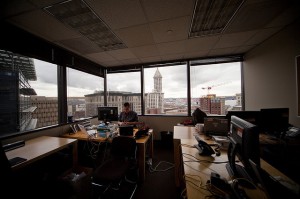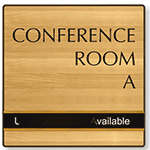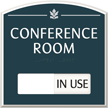Windowless offices result in less sleep for workers, says study
That sweet corner office isn’t just about the little luxuries, like stretching legs and slamming doors: Being exposed to natural light may have a major impact on worker health, according to a recent case study, reports Co.Design. This small study, led by architects and medical researchers, compared those workers exposed to natural light at work to those deprived of it. Workers with windows ranked higher on a self-reported study measuring health and sleep, and even slept an additional 46 minutes nightly, compared to the other group.
“We really wanted to look at some health issues related to lack of natural light in people’s lives in general,” Mohamed Boubekri, an architectural scholar at the University of Illinois who led the study, explains to Co.Design. Why conduct the study in office buildings? “That’s where most of us spend a good chunk of our lives.”

Workers exposed to natural light are more active and get more sleep. From Shane Lin.
Those 27 workers who sat in windowless offices — or far enough away from a window as to be deprived of natural light — scored lower than the 22 workers who did have access to light on an eight-part health survey called “Short Form 36.” In particular, the light-deprived workers scored lower on the survey’s Vitality section, and they also showed “worse overall sleep quality” as measured on a reliable self-report sleep scale. These workers also “fared worse on five other sleep measures, including sleep fragmentation (or waking up during the night), though these differences weren’t statistically significant.”
Aside from the self-reporting, 21 of the study participants wore a watch that tracked activity patterns and light exposure. Data collected via the watch confirmed that the window-free workers were exposed to less daylight, slept an average of 46 minutes less than their counterparts on work nights, and were less physically active throughout the day.
But some of the benefits of light exposure seem to outlive the work week. Window-accessible workers slept better than their window-free counterparts on non-work nights — approximately 8.5 hours as opposed to 6.5 hours. Workers with windows also got more natural light exposure after work and on non-working days as well. A potential reason for the disparity? Researcher Boubekri suggests that those who receive daylight during the day might have more energy to go outside during free time.
Though this particular study was relatively small, its findings are significant: Window exposure may translate into improved quality of life ratings, more activity, and improved sleep. (There is not much existing research on daylight exposure’s impact on worker health, though, as Co.Design reports, a 1997 study suggested lighting could be thought of as a “preventative medicine.”)
Office lighting can be an economic issue, too: Commercial buildings without windows cost more to construct yet are worth 20 percent less per square foot. And the impact of lighting on the environment is also growing in importance; as Boubekri explains, “In an era where we’re trying to limit consumption of fossil energy resources, we really should be thinking in a different way about these things… not just using electric light to light our lives.”
Category: Office courtesy, Office Hazards














